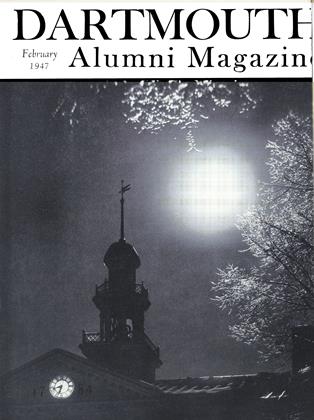THE ROLE OF THE PRESS
Three Prominent Dartmouth Journalists Give Their Answers to Questions Concerning the Freedom and Influence of Our Newspapers
AS THE SECOND installment in the series on Public Opinion in a Democracy, which was introduced last month by an article by Dr. Hadley Cantril '28, director of the Office of Public Opinion Re- search at Princeton, the ALUMNI MAGAZINE this month presents three articles by Dartmouth men prominent in the journalistic world. The editors have asked them to give their outspoken views about the role of the press and have posed these questions: What is the job of the press in a democratic society? Should it reflect public opinion or form it? Do we have a "free" press in the United States today? If not, what are the forces, anti-democratic and otherwise, that are vitiating this freedom? How much news behind the news does the American public get? Is the profit motive compatible with impartial and complete presentation of the news? Do you discern any trend in the American press that would indicate what we may expect in the next 25 years?
The following personal statements have been written by Carl D. Groat '11, Editor of The Cincinnati Post-, Claude A. Jagger '24, Associated Press executive and Associate Director of the American Press Institute at Columbia; and A. J. Liebling '24 of TheNew Yorker, foreign correspondent during the war. Biographical details about the authors will be found in the following pages.
 View Full Issue
View Full Issue
More From This Issue
-
 Class Notes
Class Notes1918
February 1947 By ERNEST H. EARLEY, DONALD L. BARR -
 Article
ArticleThe American Press
February 1947 By CARL D. GROAT '11 -
 Article
ArticleYour Newspaper and You
February 1947 By CLAUDE A. JAGGER '24 -
 Article
ArticleA Free Press?
February 1947 By A. J. LIEBLING '24 -
 Class Notes
Class Notes1943
February 1947 By FRED F. STOCK WELL, WILLIAM T. MAECK -
 Class Notes
Class Notes1928
February 1947 By OSMUN SKINNER, RUPERT C. THOMPSON JR.
Article
-
 Article
ArticlePASTOR OF CHURCH OF CHRIST SUFFERS NERVOUS BREAKDOWN
January, 1925 -
 Article
ArticleWAH HOO WAH!
January 1947 -
 Article
ArticleTwo Dartmouth Men Are Rhodes Scholars
January 1950 -
 Article
ArticleClub Calendar
November 1951 -
 Article
ArticleA Sun-Powered Race Between Two Very Different Schools
December 1988 By Timothy J. Burger '88 -
 Article
ArticleThayer School
November 1941 By William P. Kimball '29


